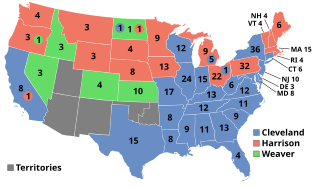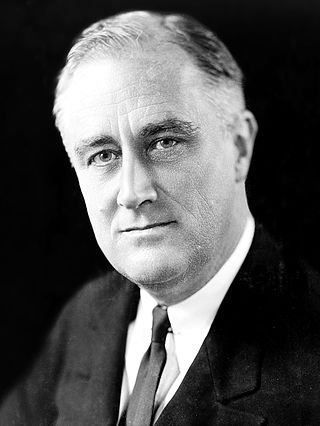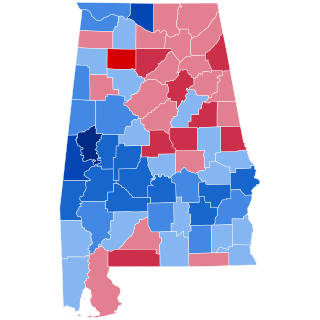Related Research Articles

The 1892 United States presidential election was the 27th quadrennial presidential election, held on Tuesday, November 8, 1892. In a rematch of the closely contested 1888 presidential election, former Democratic President Grover Cleveland defeated incumbent Republican President Benjamin Harrison. Cleveland's victory made him the first and, to date, the only person in American history to be elected to a non-consecutive second presidential term. It was also the first of two times incumbents were defeated in consecutive elections—the second being Jimmy Carter's defeat of Gerald Ford in 1976, followed by Carter's subsequent loss to Ronald Reagan in 1980.

The 1928 United States presidential election was the 36th quadrennial presidential election, held on Tuesday, November 6, 1928. Republican former Secretary of Commerce Herbert Hoover defeated the Democratic nominee, Governor Al Smith of New York. After President Calvin Coolidge declined to seek reelection, Hoover emerged as his party's frontrunner. As Hoover's party opponents failed to unite around a candidate, Hoover received a large majority of the vote at the 1928 Republican National Convention. The strong state of the economy discouraged some Democrats from running, and Smith was nominated on the first ballot of the 1928 Democratic National Convention. Hoover and Smith had been widely known as potential presidential candidates long before the 1928 campaign, and both were generally regarded as outstanding leaders. Both were newcomers to the presidential race and presented in their person and record an appeal of unknown potency to the electorate. Both faced serious discontent within their respective parties' membership, and both lacked the wholehearted support of their parties' organization.

The 1932 United States presidential election was the 37th quadrennial presidential election, held on Tuesday, November 8, 1932. The election took place against the backdrop of the Great Depression. The incumbent Republican President Herbert Hoover was defeated in a landslide by Democrat Franklin D. Roosevelt, the governor of New York and the vice presidential nominee of the 1920 presidential election. Roosevelt was the first Democrat in 80 years to simultaneously win an outright majority of the electoral college and popular vote, a feat last accomplished by Franklin Pierce in 1852, as well as the first Democrat in 56 years to win a majority of the popular vote, which was last done by Samuel J. Tilden in 1876. Roosevelt was the last sitting governor to be elected president until Bill Clinton in 1992. Hoover became the first incumbent president to lose an election to another term since William Howard Taft in 1912, and the last to do so until Gerald Ford lost 44 years later. The election marked the effective end of the Fourth Party System, which had been dominated by Republicans. It was the first time since 1916 that a Democrat was elected president.

The Reform Party of the United States of America (RPUSA), generally known as the Reform Party USA or the Reform Party, is a centrist political party in the United States, founded in 1995 by Ross Perot.

The Prohibition Party is a political party in the United States known for its historic opposition to the sale or consumption of alcoholic beverages and as an integral part of the temperance movement. It is the oldest existing third party in the United States and the third-longest active party.
Monica Gail Moorehead is an American retired teacher, writer, and political activist. She was the presidential nominee of the Workers World Party (WWP) in 1996, 2000, and 2016.
Arrin Hawkins is an American activist and political candidate. Hawkins ran as the vice presidential nominee of the Socialist Workers Party in the 2004 U.S. presidential election, while Róger Calero ran for president.
Law Preservation Party was the name used in the State of New York by the Prohibition Party during the early 1930s. The name change was done to affirm their support of the continuance of Prohibition in the United States in the face of widespread opposition which ended with the passing of the 21st Amendment in 1933.

Stewart Alexis Alexander is an American democratic socialist politician, presidential nominee for the Socialist Party USA in the 2012 election, and former SPUSA nominee for Vice President of the United States in the 2008 election.
William Frederick Varney was an American politician who served as the Prohibition Party's presidential candidate in 1928 and in other New York campaigns.
The Libertarian Party of the United States was formed in Colorado Springs in the home of Luke Zell by a group of individuals led by David Nolan on December 11, 1971, after several months of debate among members of the Committee to Form a Libertarian Party, founded July 17. The formation was prompted in part by price controls and the end of the Gold Standard implemented by President Richard Nixon. The Libertarian Party viewed the dominant Republican and Democratic parties as having diverged from what they viewed as the libertarian principles of the American Founding Fathers. This group included John Hospers, Edward Crane, Manuel Klausner, Murray Rothbard, Roy Childs, D. Frank Robinson, Theodora (Tonie) Nathan, and Jim Dean.
This article contains lists of official and potential third party and independent candidates associated with the 1996 United States presidential election.
The American Party of 1924 was a short-lived American political party.

The 1928 United States presidential election in Alabama took place on November 6, 1928, as part of the 1928 United States presidential election, which was held throughout all contemporary forty-eight states. Voters chose twelve representatives, or electors to the Electoral College, who voted for president and vice president. This was the last election in which Alabama had twelve electoral votes: the Great Migration caused the state to lose congressional districts after the 1930 Census produced the first Congressional redistricting since 1911.

The 1928 United States presidential election in Georgia took place on November 6, 1928, as part of the wider United States presidential election. Voters chose 14 representatives, or electors, to the Electoral College, who voted for president and vice president.
This article lists third-party and independent candidates, also jointly known as minor candidates, associated with the 2020 United States presidential election.

The 1936 United States presidential election in North Dakota took place on November 3, 1936, as part of the 1936 United States presidential election. Voters chose four representatives, or electors to the Electoral College, who voted for president and vice president.

The 1928 United States presidential election in Indiana took place on November 6, 1928, as part of the 1928 United States presidential election which was held throughout all contemporary 48 states. Voters chose 15 representatives, or electors to the Electoral College, who voted for president and vice president.
Philip Andrew Collins is an American politician who was the Prohibition Party's presidential nominee for the 2020 presidential election. Collins was active in local politics in Illinois and Nevada.
This article lists third-party and independent candidates, also jointly known as minor candidates, associated with the 2024 United States presidential election.
References
- 1 2 Richardson, Darcy G. (January 2008). Others: Fighting Bob La Follette and the Progressive Movement: Third-party Politics in the 1920s. iUniverse. pp. 326–. ISBN 9780595481262 . Retrieved 23 March 2016.